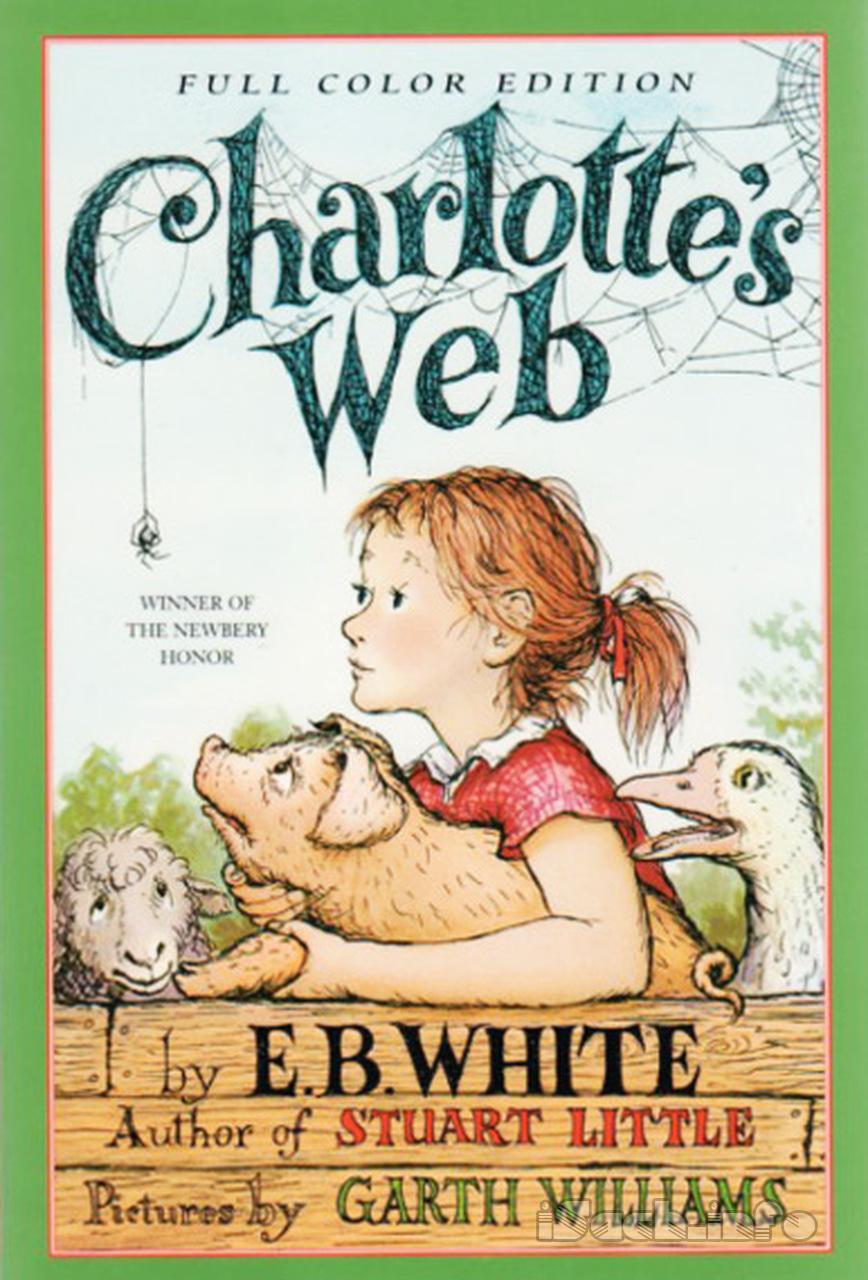Chapter 14: Dr. Dorian
T
he next day was Saturday. Fernstood at the kitchen sink drying the
breakfast dishes as her mother washed
them. Mrs. Arable worked silently. She
hoped Fern would go out and play with
other children, instead of heading for the
Zuckermans' barn to sit and watch
animals.
"Charlotte is the best storyteller I
ever heard," said Fern, poking her dish
towel into a cereal bowl.
"Fern," said her mother sternly,
"you must not invent things. You know
spiders don't tell stories. Spiders can't
talk."
"Charlotte can," replied Fern. "She
doesn't talk very loud, but she talks."
"What kind of story did she tell?"
asked Mrs. Arable.
"Well," began Fern, "she told us
about a cousin of hers who caught a fish
in her web. Don't you think that's
fascinating?"
"Fern, dear, how would a fish get in
a spider's web?" said Mrs. Arable. "You
know it couldn't happen. You're making
this up."
"Oh, it happened all right," replied
Fern. "Charlotte never fibs. This cousin
of hers built a web across a stream. One
day she was hanging around on the web
and a tiny fish leaped into the air and got
tangled in the web. The fish was caught
by one fin, Mother; its tail was wildly
thrashing and shining in the sun. Can't
you just see the web, sagging
dangerously under the weight of the fish?
Charlotte's cousin kept slipping in,
dodging out, and she was beaten
mercilessly over the head by the wildly
thrashing fish, dancing in, dancing out,
throwing..."
"Fern!" snapped her mother. "Stop
it! Stop inventing these wild tales!"
"I'm not inventing," said Fern. "I'm
just telling you the facts."
"What finally happened?" asked her
mother, whose curiosity began to get the
better of her.
"Charlotte's cousin won. She
wrapped the fish up, then she ate him
when she got good and ready. Spiders
have to eat, the same as the rest of us."
"Yes, I suppose they do," said Mrs.
Arable, vaguely.
"Charlotte has another cousin who
is a balloonist. She stands on her head,
lets out a lot of line, and is carried aloft
on the wind. Mother, wouldn't you
simply love to do that?"
"Yes, I would, come to think of it,"
replied Mrs. Arable. "But Fern, darling,
I wish you would play outdoors today
instead of going to Uncle Homer's barn.
Find some of your playmates and do
something nice outdoors. You're
spending too much time in that barn - it
isn't good for you to be alone so much."
"Alone?" said Fern. "Alone? My
best friends are in the barn cellar. It is a
very sociable place. Not at all lonely."
Fern disappeared after a while,
walking down the road toward
Zuckermans'. Her mother dusted the
sitting room. As she worked she kept
thinking about Fern. It didn't seem
natural for a little girl to be so interested
in animals. Finally Mrs. Arable made up
her mind she would pay a call on old
Doctor Dorian and ask his advice. She
got in the car and drove to his office in
the village.
Dr. Dorian had a thick beard. He
was glad to see Mrs. Arable and gave
her a comfortable chair.
"It's about Fern," she explained.
"Fern spends entirely too much time in
the Zuckermans' barn. It doesn't seem
normal. She sits on a milk stool in a
corner of the barn cellar, near the
pigpen, and watches animals, hour after
hour. She just sits and listens."
Dr. Dorian leaned back and closed
his eyes.
"How enchanting!" he said. "It must
be real nice and quiet down there.
Homer has some sheep, hasn't he?"
"Yes," said Mrs. Arable. "But it all
started with that pig we let Fern raise on
a bottle. She calls him Wilbur. Homer
bought the pig, and ever since it left our
place Fern has been going to her uncle's
to be near it."
"I've been hearing things about that
pig," said Dr. Dorian, opening his eyes.
"They say he's quite a pig."
"Have you heard about the words
that appeared in the spider's web?"
asked Mrs. Arable nervously.
"Yes," replied the doctor.
"Well, do you understand it?" asked
Mrs. Arable.
"Understand what?"
"Do you understand how there
could be any writing in a spider's web?"
"Oh, no," said Dr. Dorian. "I don't
understand it. But for that matter I don't
understand how a spider learned to spin
a web in the first place. When the words
appeared, everyone said they were a
miracle. But nobody pointed out that the
web itself is a miracle."
"What's miraculous about a spider's
web?" said Mrs. Arable. "I don't see
why you say a web is a miracle - it's just
a web."
"Ever try to spin one?" asked Dr.
Dorian.
Mrs. Arable shifted uneasily in her
chair. "No," she replied. "But I can
crochet a doily and I can knit a sock."
"Sure," said the doctor. "But
somebody taught you, didn't they?"
"My mother taught me."
"Well, who taught a spider? A
young spider knows how to spin a web
without any instructions from anybody.
Don't you regard that as a miracle?"
"I suppose so," said Mrs. Arable. "I
never looked at it that way before. Still,
I don't understand how those words got
into the web. I don't understand it, and I
don't like what I can't understand."
"None of us do," said Dr. Dorian,
sighing. "I'm a doctor. Doctors are
supposed to understand everything. But I
don't understand everything, and I don't
intend to let it worry me."
Mrs. Arable fidgeted. "Fern says
the animals talk to each other. Dr.
Dorian, do you believe animals talk?"
"I never heard one say anything," he
replied. "But that proves nothing. It is
quite possible that an animal has spoken
civilly to me and that I didn't catch the
remark because I wasn't paying attention.
Children pay better attention than
grownups. If Fern says that the animals
in Zuckerman's barn talk, I'm quite ready
to believe her. Perhaps if people talked
less, animals would talk more. People
are incessant talkers - I can give you my
word on that."
"Well, I feel better about Fern,"
said Mrs. Arable. "You don't think I need
worry about her?"
"Does she look well?" asked the
doctor.
"Oh, yes."
"Appetite good?"
"Oh, yes, she's always hungry."
"Sleep well at night?"
"Oh, yes."
"Then don't worry," said the doctor.
"Do you think she'll ever start
thinking about something besides pigs
and sheep and geese and spiders?"
"How old is Fern?"
"She's eight."
"Well," said Dr. Dorian, "I think
she will always love animals. But I
doubt that she spends her entire life in
Homer Zuckerman's barn cellar. How
about boys - does she know any boys?"
"She knows Henry Fussy," said
Mrs. Arable brightly.
Dr. Dorian closed his eyes again
and went into deep thought.
"Henry Fussy," he mumbled. "Hmm.
Remarkable. Well, I don't think you have
anything to worry about. Let Fern
associate with her friends in the barn if
she wants to. I would say, offhand, that
spiders and pigs were fully as
interesting as Henry Fussy. Yet I predict
that the day will come when even Henry
will drop some chance remark that
catches Fern's attention. It's amazing
how children change from year to year.
How's Avery?" he asked, opening his
eyes wide.
"Oh, Avery," chuckled Mrs. Arable.
"Avery is always fine. Of course, he gets
into poison ivy and gets stung by wasps
and bees and brings frogs and snakes
home and breaks everything he lays his
hands on. He's fine."
"Good!" said the doctor.
Mrs. Arable said goodbye and
thanked Dr. Dorian very much for his
advice. She felt greatly relieved.



 ePub
ePub A4
A4